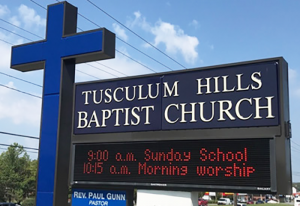Editor’s note: The name of the Nashville resident who works with Middle Eastern refugees overseas has been changed for her protection.
IMB news office
NASHVILLE — Meeting a refugee at a community center in Nashville helped set the trajectory where Evie Tucker finds herself today, working among Middle Eastern refugees in a community center overseas.
Nashville, Tucker’s hometown, is home to the largest population of refugees from one Middle Eastern people group. Many of the refugees live in one section of town that has become a refugee resettlement location.
Tusculum Hills Baptist Church is located in this part of town, and before moving overseas, Tucker taught at an English as a second language center located in the church.
Tucker, a missionary with the International Mission Board, said there are 91 different people groups in Middle Tennessee and there are between 30 to 40 unreached people groups represented in a one-mile radius of the church. She recalls hearing how Tusculum Hills began praying for the Lord’s direction and how they could be involved in reaching their neighbors.
The Lord answered by directing them to open their facilities for ESL classes. Tucker’s home church, Forest Hills Baptist Church in Nashville and Nashville First Baptist Church partner with Tusculum Hills to minister to refugees.
At the ESL center, Tucker met a woman who shared her story of fleeing her country, living in a refugee camp for five years, losing her husband in the camp and her difficult journey to the U.S.
Through listening to her story, the Lord planted a love of the woman’s people group in Tucker’s heart. Tucker had begun the process to serve with the IMB and prayed as she drove to a job-matching conference about where the Lord would have her serve.
The Lord kept bringing to mind the faces of the refugee women at the center. She accepted a position serving among the same refugee people group overseas.
Gathering the scattered
Tucker and her IMB teammates are using community outreach to minister among refugees.
Language classes have met a particularly important need. Many of the refugee women did not go outside their houses in their home country for cultural reasons, and some assumed it would be the same in the country they fled to, so they viewed learning the language as unnecessary.
Tucker said many refugees did not have a long-term mentality of staying in the country. Some expected they would return to their home country, and others planned on resettlement in another country.
Since moving becomes an ever-decreasing reality, they are seeing the value of learning the language.
Local Christians are teaching the language classes, and Tucker says it gives the Christians a chance to serve and show their concern.
The refugees have remarked on the untainted love they see being displayed by the local Christians.
Tucker, other IMB missionaries and Christians are often invited over to refugees’ homes after the classes. The home visits allow them to be open about what they believe, ask if they are interested in studying the Bible and build a Christ-centered community.
In their home country, refugees had strong communities, but war scattered their families and friends like shards of glass. Trust was also shattered. Refugees in Tucker’s city often reside in small communities and are reluctant to trust.
Tucker focuses on helping them build connection and trust within their community,
COVID-19 necessitated the closure of many outreach efforts, but Tucker and her teammates adapted their programs to meet in smaller groups and homes.
The pandemic has also changed the forum for discipleship. Tucker is unable to travel to visit a refugee she is discipling who lives in another city, so the women moved their study online.
At the end of one of their lessons, Tucker asked the woman, Kala, if there was someone with whom she could share the gospel. Kala immediately named several people.
Kala began sharing with the people she mentioned, and over phone calls took the lessons she learned from Tucker to share the gospel with her sister, who still lives in their hometown. Her sister recently committed her life to Christ.
Kala is married to a non-Christian, but some of her daughters join her in the Bible study.
Initially, when Kala started studying with Tucker, Kala didn’t feel confident enough to teach the Bible on her own, but now, Kala hopes to start a study group in her home.
At home and abroad
Short-term teams from the U.S. have come to partner with Tucker. These teams have allowed Tucker different opportunities to invest in the refugee community. Each team has been able to use their gifts and backgrounds to hold different community outreach events to meet the needs of the refugee community.
Tucker encourages churches to look for opportunities to serve domestically as well.
There is a natural connection between Tucker’s ministry among the refugee people group overseas and the church’s ministry among refugees in Nashville.
“This people group is in Nashville, they’re in your backyard. These people that you’re praying for me to be here working with, they live right down the street from you, too,” Tucker encouraged her church. B&R

